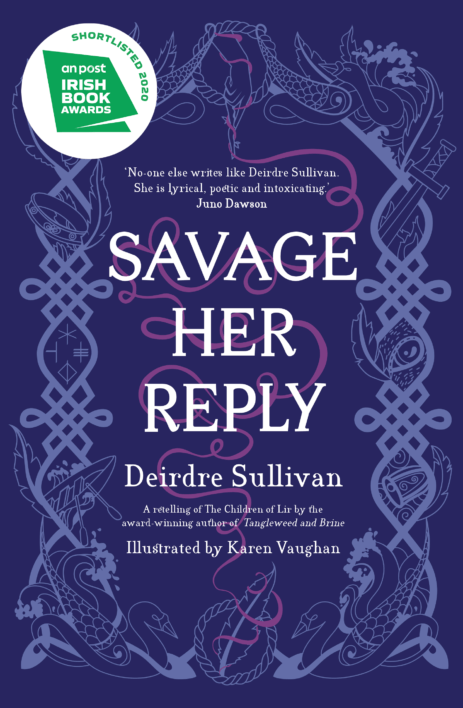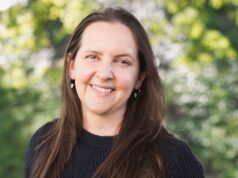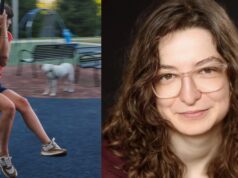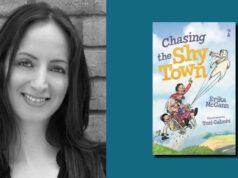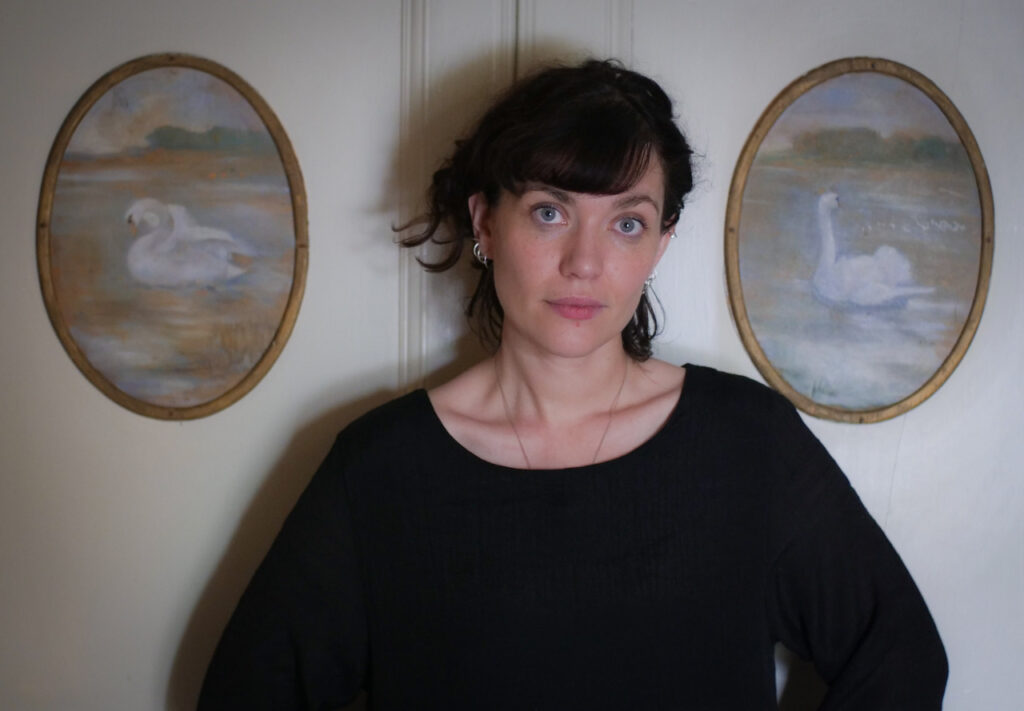
Mary McCarthy chats to Deirdre Sullivan about her latest book Savage Her Reply – Winner of the Dept 51 @ Eason Teen and Young Adult Book of the Year, Irish Book Awards 2020
Deirdre Sullivan’s Savage Her Reply retells the Children of Lir story at a new angle because, for the first time, it gives an insight into why ‘the witch’ Aífe acts the way she does.
The myth, thought to date back to the fourteenth century, tells us when Aoibh dies, her father offers her grieving husband Lir his other daughter Aífe as compensation. Aífe steps obediently into the shoes as wife number two to look after Lir and Aoibh’s four children, but, after hiding in the forest for a year, she goes mad with jealousy of Lir’s affection for his kids and turns the kids into swans for 900 years.
The story, retold through the voice of Aífe, is dark and unsettling, and yet somehow it’s easy to read about her descent into what was most probably, according to this retelling, clinical depression and the horrendous guilt that follows. It has been labelled a feminist retelling because, for the first time, it throws up the suggestion that the woman committed the crime but the men had a lot to answer for.
‘If I had been a favoured daughter, perhaps my fate would have been different. If Lir had loved me back, or been respectful of the love I had given him,’ Aífe writes. She tells the reader the children did not love her and she certainly did not love herself: ‘they learned from their father how little I mattered … There was a hole inside me, when I looked at myself I hated what I saw.’
There is a nice symmetry to this book. It is Deirdre’s tenth and also the hundredth for Little Island publishers, who cater for the YA market. In 2017 they also published Deirdre’s equally dark fairy tale retellings Tangleweed and Brine.
Physically, it’s a gorgeous book. Between the chapters are calligrams, small poems laid out in wild shapes that reflect the madness throughout the story. The shapes mimic the letters of the earliest Irish alphabet called Ogham (thought to date back to the fourth century BC), which was originally eight letters named after trees.
She writes in a style that keeps you hooked and while the YA market is loving her work—she is currently up for an An Post award for Teen/Young Adult Book of the Year—there is no pigeonholing Deirdre. She writes short fiction, plays and younger children’s books all while keeping down a full-time busy teaching job.
We catch up on zoom and she tells me how she keeps the plates spinning.
You have said Savage Her Reply was not easy to write. Why did you want to?
I enjoyed the challenge of how to explain what happens to Aífe because, while the character of Lir sticks out in the myth, she just disappears. I was going to include Children of Lir in Tangleweed initially, but I couldn’t mould it to that collection. I’m glad it came back in a longer form. I wanted to take the space to read around the characters.
Coming back to it as a grown up I saw different things—she goes to bed for a year, and I hesitate to put a diagnosis on it, but if you can’t move for a year there must be an element of depression there. So many of the mythical hunter-warriors were horrible men, like Culchollon and Fionn Mac Cumhaill, and Lir fits in with the famous warrior killed in battle narrative. Re-reading these stories it felt to me children and women were not valued, with women basically viewed as baby-making factories and political bargaining chips! As a child you accept this, but as an adult it struck me as awful and I could not stop thinking about how being treated that way must have affected the women.
It was hard to write to and easy to write—if that makes any sense? I did a lot of research; I did a year of reading on it and it could have taken longer—there is so much to it. I had thought the Ogham letters were one thing, but discovered they were another. I wrote it in the first person, as I tend to feel alongside with my character, so this made sense. Once I had done enough research it flowed easily.
UCD’s Dr Kelly Fitzgerald (lecturer at the School of Irish, Celtic Studies and Folklore) read the final draft and gave me valuable feedback. She also launched it for me and it was great to get her vote of confidence.
Did you like scary stories as a child?
Yes, I love scary stories and I love writing them. I’m working on a book in the ‘Nightmare Club’ series—it’s ghostwritten by Irish writers and supposed to be written by twelve-year-old Annie Graves. It’s a lot of fun writing that. When the series first came out I did a reading in the crypt in Dublin Castle at Halloween, and it’s a shame nothing like that is going on at the moment. It’s wonderful to see how the organisations and festivals have found a creative way to go on in the pandemic—such as the Redline Dublin literary festival—but it’s not really the same.
How do you research a new book?
I have been using the library to do a lot of distance-learning courses lately—herbalism and reading tarot cards. They have loads of free courses on their website. I’m currently writing a book on witchcraft; I find it fascinating getting into a topic from scratch. I read a lot of memoirs of mental illness—it is something I am interested in but I don’t let science lead what happens in my stories, I just tend to go with how I think the character would likely act. People are more than their condition. Every person who lives with mental health problems is different because their illness intersects with their life and everyone has different coping mechanisms and strategies for getting through.
Where do you like to write?
Funnily enough, I find it less distracting to write in a cafe instead of at home. There you find 90 things you need to do—sweep the floor, fill out a form … In the cafe it is just me and my laptop. I find it easier to switch off with a bit of background noise, though it can take a bit longer to get stuck in, but once I do the world melts away. My partner is a writer and video editor so is often at the kitchen table working also, which is another reason I like to go out! He has an office but even before the pandemic did a lot of work from home.
What authors do you like?
I was a very big reader growing up and libraries were instrumental in that. The first time I really bonded with the Children of Lir was when I borrowed Micheal Scott’s retelling from Galway City library. There are so many writers who have made a lasting impact on me. Shirley Jackson for her tension—she makes the mundane sinister; Dorothy Parker and Marian Keyes for their wit; Virginia Woolf for her use of language; Angela Carter for her retellings and use of Gothic and folkloric elements in her work. There are too many to list. Every story you encounter teaches you something.
Do you write for adults too?
I have some short fiction in The Dublin Review and the Banshee journal. When I have a deadline for a book, I am fitting it in around teaching and, suddenly, writing can feel like something I have to do. So, I love having a sideline and that’s why I fiddle around with short fiction. I also often get a good idea and don’t think it is YA, but, mainly, it’s just because I just enjoy it.
Do you think social media is a good thing for writers?
I do find myself scrolling a lot; I try to limit myself to checking the news twice a day and I can do that for a while, but tend to relapse and the cycle starts over. Then I have a go at turning my phone off, which is step two of my strategy and this works. It is good to check information and connect with people. I enjoy following writers like Joanne Harris—there are some great threads. It can be a great way to inform people but can equally be used for bad. I don’t really like promoting myself online but social media is useful for people to become more aware of Irish writing, so that’s a good thing. The writing world is small in Ireland and everyone knows everyone. We are all colleagues. I absolutely love it when readers get in touch. For writers, it is a huge privilege to know our work has touched someone. I feel so lucky to write for young adults—it is such an intense time.
What did you study?
I grew up in Galway and studied French and Legal Studies in Galway. After college I did a Masters in Drama and then a postgrad in Education. I think I did want to be a writer but it never seemed like a concrete possibility. My mum was a teacher and my dad worked for the Health Board so I did not really have a frame of reference for seeing writing as a career.
I was not confident in my own voice to share it with others and would see posters for the writers societies but would think ‘What if nobody likes what I write?’ In my final year I plucked up the courage to go along, and it was so scary reading my work for the first time in public. My hands were shaking. I’ve been on panels now for the best part of a decade so am used to it but still I find it easier to read my work than just to be myself. Book launches are always nice when they are happening but I am so nervous beforehand and am always wondering ‘What if nobody shows up?’
Did your drama studies help your writing?
That year I did a Masters in Drama, it felt like college was supposed to feel. We were a small group and everyone was really passionate. There was a module on reviewing that got me thinking about the building blocks of a story. I did act in a few productions the year after I graduated from the MA. It is a hard life—I don’t think I could handle it, though I did enjoy it. I used to do a horror podcast, but to follow an acting career at a professional level was a sacrifice I could not make. I find teaching so rewarding and satisfying and my income is regular so I don’t have to worry about making the rent. It is a difficult time for the acting profession and many authors writing for children depend on festivals and school visits, so I do feel very fortunate.
How do you manage your time?
Some days are tricky—during term time I can’t prioritise characters in books that are made up when I have little people I work with that are real. I have lovely teacher holidays so that’s when I fit in the writing and on weekends. I love it, so that’s how I make it work.
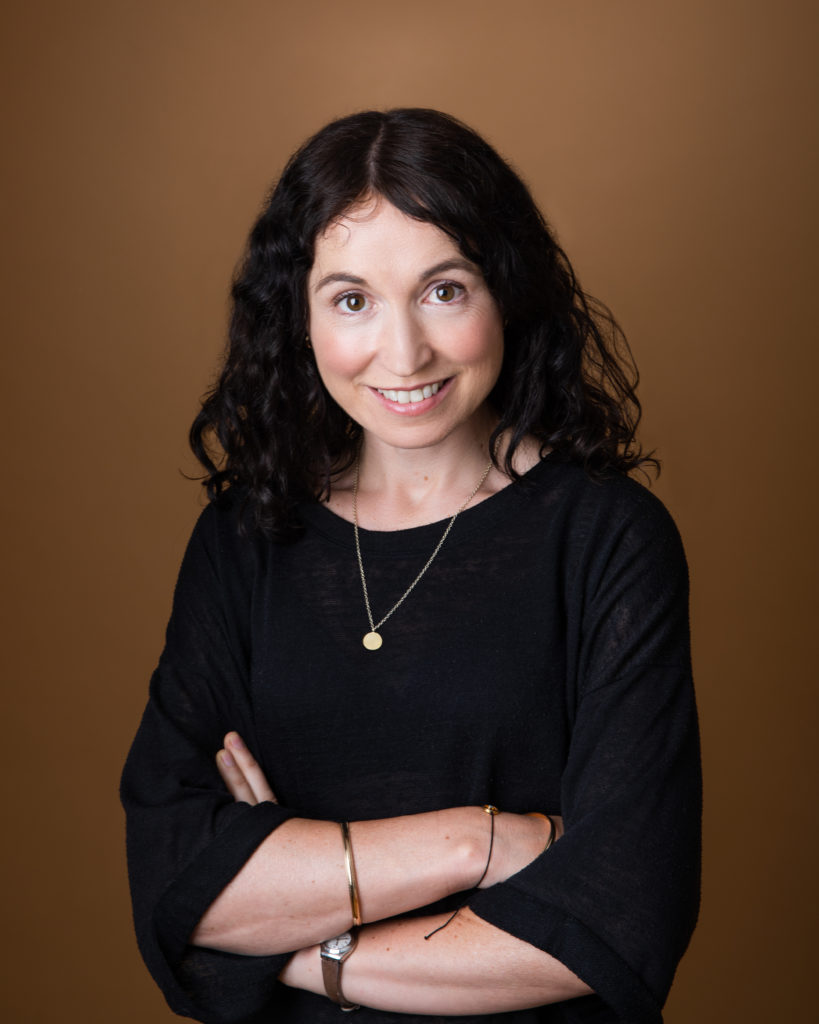
Mary McCarthy: This Literary Life
Mary McCarthy is a freelance journalist writing for a number of publications. She is an avid reader and an iron-willed book club administrator.
@maryknowsbees







